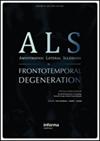韩文《肌萎缩侧索硬化症特异性生活质量》的翻译与心理测量评估-修订
IF 2.8
4区 医学
Q2 CLINICAL NEUROLOGY
Amyotrophic Lateral Sclerosis and Frontotemporal Degeneration
Pub Date : 2017-01-02
DOI:10.1080/21678421.2016.1249885
引用次数: 8
摘要
摘要目的:目的是将肌萎缩侧索硬化症特异性生活质量-修订工具(ALSQOL-R)翻译成韩语,并检查韩国肌萎缩侧索硬化症(ALS)人群的心理测量特性。方法:翻译包括前向翻译和后向翻译。韩国ALS多学科诊所的患者对韩国版ALSQOL-R的心理测量特性进行了测试(n = 120)。评估了内部一致性、重测信度、内容有效性、标准相关有效性和结构有效性。结果:关于可靠性估计,内部一致性(Cronbachα = 0.92)和测试-重新测试可靠性(ICC = 0.89)表现良好。关于有效性估计,K-ALSQOL-R与麦吉尔生活质量单项量表(R = 0.62)和世界卫生组织生活质量工具简报(WHOQOL-BREF)的第一个问题(r = 0.64)。验证性因素分析支持六因素模型。结论:K-ALSOQL-R可作为一种可靠、有效的韩国ALS患者生活质量指标。本文章由计算机程序翻译,如有差异,请以英文原文为准。
Translation and Psychometric Evaluation of a Korean Version of the Amyotrophic Lateral Sclerosis-Specific Quality of Life – Revised
Abstract Objective: The objective was to translate the Amyotrophic Lateral Sclerosis-Specific Quality of Life - Revised instrument (ALSSQOL-R) into Korean and to examine the psychometric properties of the Korean amyotrophic lateral sclerosis (ALS) population. Methods: The translation involved forward and backward translation. The psychometric properties of the Korean version of the ALSSQOL-R (K-ALSSQOL-R) were tested by patients in an ALS multidisciplinary clinic in Korea (n = 120). The internal consistency, test-retest reliability, content validity, criterion-related validity, and construct validity were evaluated. Results: With regard to the reliability estimate, the internal consistency (Cronbach’s alpha = 0.92) and the test–retest reliability (ICC = 0.89) were good. With regard to the validity estimate, the K-ALSSQOL-R demonstrated concurrent validity with the McGill Quality of Life Single-Item Scale (r = 0.62) and the first question of the World Health Organisation QOL Instrument-Brief (WHOQOL-BREF) (r = 0.64). The convergent validity and discriminant validity were acceptable. The confirmatory factor analysis supported a six-factor model. Conclusion: The K-ALSSOQL-R can be used as a reliable and valid measure of QOL among Korean ALS patients.
求助全文
通过发布文献求助,成功后即可免费获取论文全文。
去求助
来源期刊

Amyotrophic Lateral Sclerosis and Frontotemporal Degeneration
CLINICAL NEUROLOGY-
CiteScore
5.40
自引率
10.70%
发文量
64
期刊介绍:
Amyotrophic Lateral Sclerosis and Frontotemporal Degeneration is an exciting new initiative. It represents a timely expansion of the journal Amyotrophic Lateral Sclerosis in response to the clinical, imaging pathological and genetic overlap between ALS and frontotemporal dementia. The expanded journal provides outstanding coverage of research in a wide range of issues related to motor neuron diseases, especially ALS (Lou Gehrig’s disease) and cognitive decline associated with frontotemporal degeneration. The journal also covers related disorders of the neuroaxis when relevant to these core conditions.
 求助内容:
求助内容: 应助结果提醒方式:
应助结果提醒方式:


